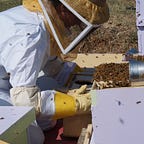3 Ways To Help Bees and Other Pollinators
Three Ways You Can Make the World a Better Place for Bees and Other Pollinators?
Smaller than a thumb, sometimes noisy, and packing a sting that’ll leave you sore for days, why should you care about what happens to honey bees? They may be small, but these little insects are by no means insignificant. They carry the weight of the world on their tiny shoulders. It is estimated that honey bees are heavily involved in the pollination of about 90% of our food crops. That means we have these adorable, yellow insects to thank for most of what we put on our plates every day. Honey bees make the world a better place to live in, and it’s only fair we return the favor.
There are many other pollinators to consider as well
When people think of pollination, honey bees mostly come to mind. They get the majority of the credit for food production but there are many other little hands involved in the process. Honey bees are one of many pollinator species that the planet’s survival depends upon. Wasps, ants, beetles, moths, butterflies, and even mosquitoes contribute significantly to pollination. Also deserving of mention are bats and birds such as hummingbirds. These are especially famous for their part in cocoa, mango, fig, date, avocado, and banana production.
How you can assist pollinators from the comfort of your home?
You don’t need to have deep pockets or go into beekeeping to help pollinators. There’s a lot you can do with very little. Here’s how:
Offering water to thirsty bees
There’s a reason bees are the epitome of industriousness, why they are referenced to paint a picture of how hard one is working. “Mary has been cleaning all day, she’s as busy as a bee.” These little critters, forager bees, in particular, carry out an enormous amount of work in gathering food for the hive. They rarely catch a breath in summer and spring, where they traverse more than 2000 flowers, flying over 5 miles daily. Wow!
With water points scarce away from the hive, thirsty bees can have a hard time finding water. In addition to finding water for themselves, these bees need some to take back to the hive. The colony heats up uncomfortably in summer, and the water offers cooling relief and humidity balance. It also liquifies larvae food.
You can be a big help to pollinators such as bees by setting out clean water. Make a simple bee bath by placing protruding rocks in a shallow container. That way, bees have a place to land when they stop by for refreshments. You can make do with a birdbath as well if you have one. Remember to change the water regularly to keep it clean and fresh.
Creating a garden inviting to pollinators
If you have a little bit more time on your hands, you can up your efforts by planting a bee-friendly garden. It’s a lot more work than setting out some water, but there’s more reward too. Hummingbirds, butterflies, and bees especially love thyme, rosemary, mint, sunflowers, lilacs, and lavender. Dandelions are also a favorite for our pollinator friends. Keep these plants in mind when cultivating your garden. For a good diversity of pollen, consider polyculture gardening. In other words, plant as many different varieties as you can.
Before you do, some research is in order. Certain plants thrive in specific conditions, so do your homework and figure out what works best for your locality. If you don’t have much room to spare, consider balcony or windowsill farming. In addition to helping bees, a garden offers many personal benefits. You can improve the aesthetic value of your home while brushing up on your hand strength. Gardening also betters your mood, shakes off stress, and generally makes you happier and healthier.
Making a home for wild bees
When people talk about protecting and sheltering bees, what they are referring to are bumblebees and honeybees. There are more than 20,000 species of bees, meaning most of them are wild. Wild bee numbers are also not looking pretty, with human encroachment destroying their natural habitats. These bees also play an important role just as the two most popular varieties. They should be remembered too in conservation efforts.
Solitary creatures that don’t like to stir up trouble, it’s easy to live with wild bees. Change the fate of a homeless bee, and the world, by putting a roof over its head, so to speak. Wild bees generally like underground spots or other places tucked away from the surface. A bee house can be as simple as drilled holes in leftover timber.
Can we live in a world without bees and pollinators?
If pollinators went extinct today, it would mean a dire state of things for the planet and the 7 billion people who call it home. They pollinate more than 80% of the flowering plants in the world. Their absence would mean a severe food shortage. Not only would we lose the plants but also the animals that depend on them for food. Help out pollinators in any way you can, no matter how little.
